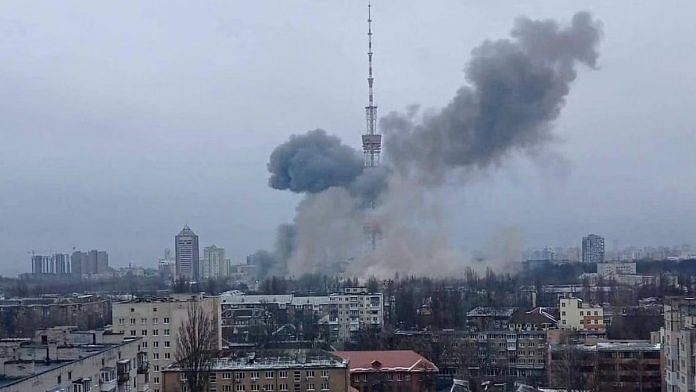Russia’s invasion of Ukraine has been met with crippling sanctions, brought an untold human and economic cost, and turned it into an international pariah. But one of the most damaging long-term consequences may be the resulting hollowing out of the nation’s vast pool of tech talent.
As many as 70,000 information technology workers have already fled the country and another 100,000 are expected to depart over the next month, the Russian Association for Electronic Communications told the nation’s Duma this month. That’s equivalent to around 13% of the sector’s workforce, one that makes an outsize contribution to the Russian economy.
Fearful of being cut off from foreign internet platforms and unable to accept payment from overseas clients, software developers are heading for neighboring Armenia and Georgia as well as Dubai, where Russians don’t require a visa. Many are likely to end up in Germany, the U.K., and the U.S.
Thousands of engineers have joined groups on Telegram, a messaging and broadcasting app, to swap tips on finding accommodation and work permits in new regions. More than 600 are in a group called “VC and Startups Welcome to Armenia,” where the top rule is “Don’t discuss politics.” One participant on Saturday asked for advice on re-incorporating their Russian startup in Armenia. A fellow group member replied with the photo of a local lawyer’s business card saying, “They will help.” Another group called “The Ark,” with more than 38,000 members, has posted the names and email addresses of people in Spain and Montenegro who’ve offered to check resumes or find good local schools.
Infamous for being among the best hackers in the world, Russia’s engineers also routinely top rankings for coding and algorithm design — the science of creating the mathematical steps used to compute and process data. Talent assessment and recruitment provider HackerRank puts Russia almost level with China as home to the world’s best developers, and at the top of the charts for the algorithms category.
In a country dominated by oil and gas exports, Russia’s IT industry accounts for a minor part of national employment, yet it’s a growing contributor to the economy. The sector comprises around 1.7% of its labor force but close to 5% of its gross domestic product. Software exports from more than 2,000 Russian technology firms total around $9 billion, mostly from outsourced-development companies like Artezio LLC and Auriga Inc.
While losing such a talent pool may not dent Russia’s GDP as much as cutting off exports of energy, the real impact is likely to be felt for years to come when the nation tries to rebuild after the war and regain its place in international markets. By that time, entire teams of engineers will have left and companies are likely to have moved offshore or closed down.
That will ripple through to other industries as they try to modernize, including banking, oil and gas exploration, and manufacturing. It would also stymie Russian President Vladimir Putin’s attempt to cut the nation’s reliance on foreign technology.
In a major policy paper published on the Kremlin’s Website in September 2009, then-President Dmitry Medvedev decried the low efficiency and productivity of the country’s businesses, and the fact that most executives didn’t even care. As a result, Russia’s influence in the global economy didn’t befit its stature. “Achieving leadership by relying on oil and gas markets is impossible,” he wrote.
His answer was to build an intelligent economy which would create and export new technologies, and reduce reliance on raw materials. Putin, who was then Prime Minister and soon to retake the presidency, appeared to embrace the notion of a “new economy.” But then he got cold feet. Facing mass protests in 2011 and 2012, he abandoned those plans and went back to the old structure, with its more immediate benefits to the bottom line. “Putin perfectly understands that a broad diversification of the economy and robust economic growth would also instantly lead to a diversification of wealth and power with uncontrollable actors,” researchers Alena Epifanova and Philipp Dietrich wrote recently for the German Council on Foreign Relations.
So he lurched in the other direction: Over the next decade Putin pushed to split Russia’s internet from the world, and develop autarkic semiconductor, cybersecurity and networking know-how.
It only partially worked. The country is notoriously proficient in cyber offense and defense, and is on the way to creating a splinternet, but is far behind in chips and other electronics. Still, the nation’s coders remain world leaders and more than 4,000 IT companies popped up to feed local and foreign demand.
The war on Ukraine could bring an end to that final global advantage, and the government appears acutely aware of it. Prime Minister Mikhail Mishustin last week announced grants of up to 1 million rubles ($10,000) in a bid to convince young entrepreneurs to stay in the country and start new businesses. In addition, government oversight of technology companies of all sizes would be reduced and income taxes abolished for three years.
Some Russian patriots may be swayed. Not by any loyalty to the government, but a belief that their country will need them once Putin is gone. But for the thousands who have already fled, and the countless more heading for the exit, the reality is most will never come back. And they’re the talent the Russian motherland will need most when the fighting finally stops. –Bloomberg
Also read: China is quietly picking up cheap Russian crude as India buys more



